---------------------------------------------------------
They say that chickens are the “gateway” animal to further farming adventures. When you are ready to skip through that gateway and expand your farm, lots of people look to adding different kinds of poultry. Common backyard poultry includes turkeys, geese, guineas, & ducks – turkeys are quite large and geese & guineas are quite loud so many will settle on ducks.
Ducks can be a great addition to a small farm. They lay large eggs about as regularly as chickens (click here to read more about duck eggs). Duck eggs are excellent for baking! Ducks don’t require a ton of room, don’t make a ton of noise, and can often fit right in with your existing chicken setup.
But ducks are definitely not chickens. While raising the two kinds of poultry together is certainly possible, each species has some different requirements. How can you make sure your mixed flock is happy & healthy? The key is making sure even though both flocks are living together, they each have what they need.
Water for drinking
Perhaps the biggest hurdle you will face when keeping ducks & chickens together is what to do with the water. Chickens do great with nipple waterers or water fonts they can dip their beaks in for a drink. Ducks on the other hand need to have access to water that is deep enough for them to dip their head in. They need to be able to dip their head in the water to clean & keep their nostrils moist, clean their eyes, and mix their food with their water for digestion.
Ducks can’t use traditional chicken water fonts because their bills won’t adequately fit in the small font opening. They can use nipple water systems, but they will still need to have a bowl of fresh, clean water available for cleaning & eating.
Of course, the ducks don’t just gently dip their bills in the water. They splash. They get in the bowl and try to swim. They add dirt & feed to the water. They make mud everywhere. Chickens don’t care for mud and muck. They don’t like when their water is dirty. I have my chickens & ducks share a water bowl. I scrub it out daily. The water is kept outside of the coop so that the shaving inside will stay dry. I also move it around the run so I don’t have one area getting overly muddy.
Water for swimming
While on the subject of water, let’s talk about swimming. Ducks technically don’t need to have a pool for swimming as long as they have a deep water dish. But they will be super happy if you give them a little kiddie pool to splash about in. It also might make them less likely to try and swim in the water bowl (but don’t hold your breath!).
Don’t worry about your chickens around the pool. For the most part, they will just stay away from it or maybe will occasionally drink from it. Adult chickens don’t like to swim, but they can naturally float so you don’t have to worry about them drowning if they accidentally fall in. If the water is shallow enough, you might find your chickens like to stand in the water to cool off in the summer.
Young chicks could however drown if left unattended near a pool. When you have chicks in your flock, consider gating off the pool, keeping it empty until they are grown, or only filling it up when you are around to supervise.
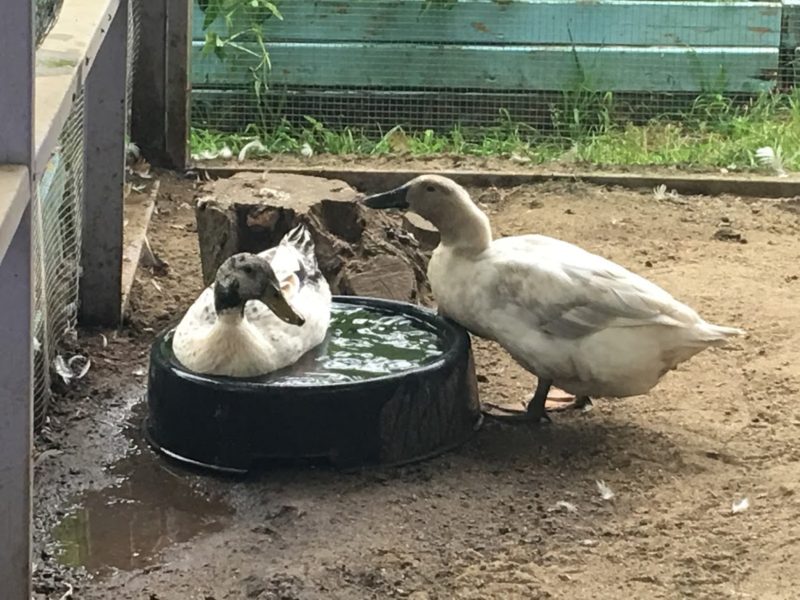
Feeding
This area is a lot easier than water. Chickens and ducks can both eat the same layer feed. The only caveat is when you have young ducklings in the flock, they will need to have access to extra niacin. I like to mix brewer’s yeast into the feed to help the ducklings get what they need (click here to read more about raising ducklings). Ducks will have a hard time fitting their bills in many chicken feeder troughs, so open bowls work best.
Ducks and chickens like the same types of treats, both will go crazy for mealworms, and both love table scraps like veggies & bread. I have found that the ducks are a bit pickier about what they eat though.
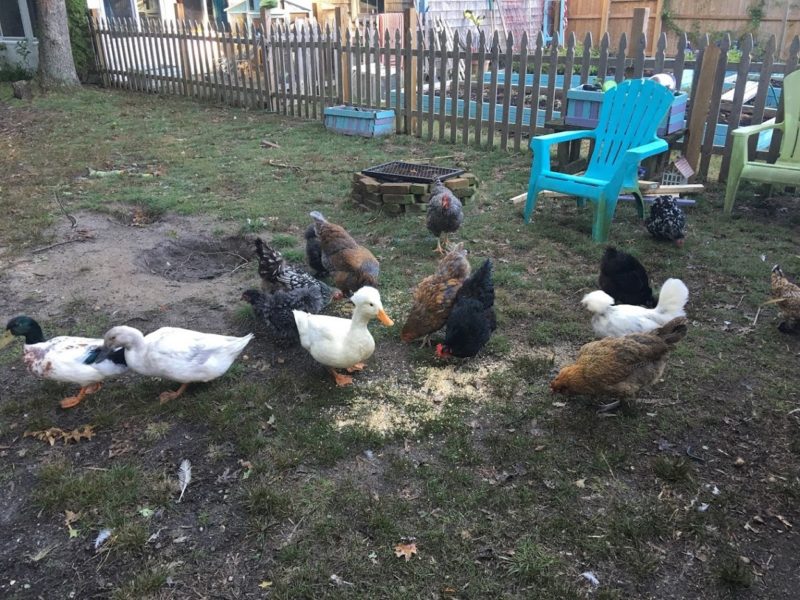
Housing
Chickens and ducks can be housed together in the same coop or you can try to keep them separate. Chickens like to roost at night, so they will need places to perch off the ground. Ducks like to nest at night, so they will need some place at ground level to sleep. When planning your coop, make sure your ducks have some place quiet to nest on the ground (and be sure it isn’t underneath the roosts or they will get pooped on all night!). Putting a dropping board under your roosts will keep the floor cleaner and stop the ducks from getting pooped on.
Be sure the ramp is not too steep to get into the coop. Chickens can navigate a steep ramp, but ducks are not great at jumping and their big floppy feet can make them a little awkward on land.
Ducks would prefer to sleep out in the open air. If at all possible, providing a small door that stays open all night, leading to a completely secure small run is best. If you do this, be sure it is totally predator-proof on every side – consider lining the entire floor of the run with wire. I don’t have a secure run, but my coop is very large so the ducks and chickens have plenty of space to move about.
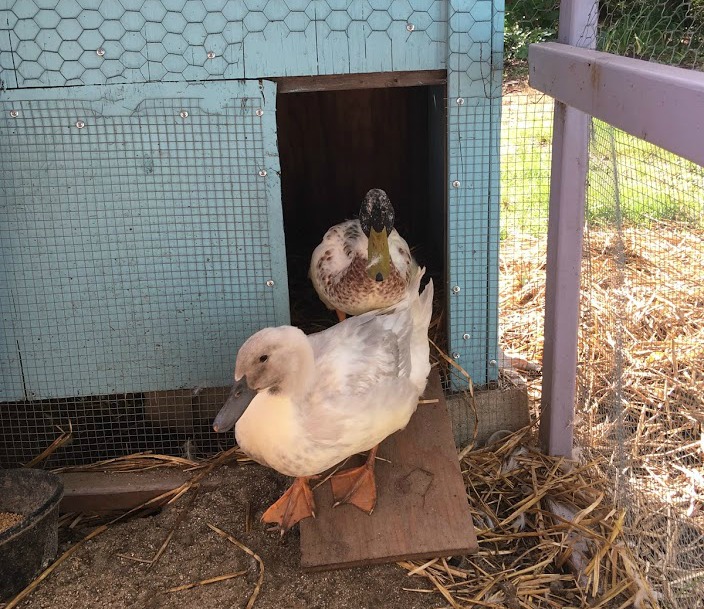
Flock Dynamics
For the most part, your ducks and chickens are likely to just ignore each other. If you have a really small flock of each type of bird they might integrate more, but generally, ducks will prefer the company of other ducks, and chickens will prefer to hang out with chickens. My birds free-range together in the yard all day. While they all come running to me for snacks and all enjoying lounging in the shade of the rhododendron bush, they keep to themselves. I wouldn’t say one flock is dominant over the other and they all seem to get along together.
In general, a group of mixed ladies will get along and would be the best situation. Add in a drake or a rooster and the dynamics are bound to change. They could get territorial. The drake or rooster could be constantly trying to chase off the other birds to ensure his ladies get the best treats or foraging ground. It all depends on the temperament of the males.
The one situation you want to take care with is having a drake (male duck) in a mixed flock without a rooster. During breeding season (spring & early summer) drakes are in the mood for love and not much can stop them. It’s best to have at least 2-3 female ducks per drake to keep him “occupied”. What you don’t want is for your drake to try and mate with your female chickens. Drakes have an external phallus where as roosters do not. As such, female chickens are not designed for that type of action and can be seriously hurt or even killed by an overzealous drake. If you have a rooster around, he will keep the hens safe. If not, just keep an eye on your drake and be ready to separate him from the flock if he bothers the chickens.
I have had a drake and no rooster for a while and he never went after any of the chickens. He actually did a good job of keeping all the ladies (duck & chicken alike) safe when out free ranging. The chickens all would take cover if they heard him quacking a warning about a potential predator. I have also had a few drakes and a couple of roosters in the flock at the same time. The drakes left the chickens alone and all the boys got along just fine.
Final thoughts
I love my mixed flock, they are all different and fun and bring so much joy to our backyard farm!
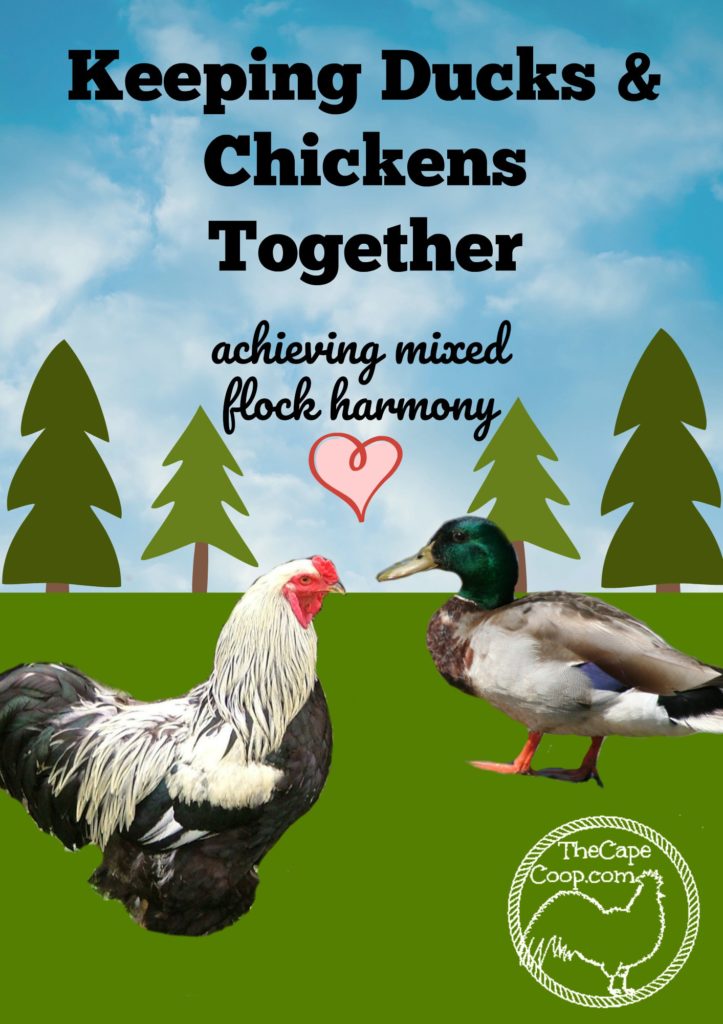
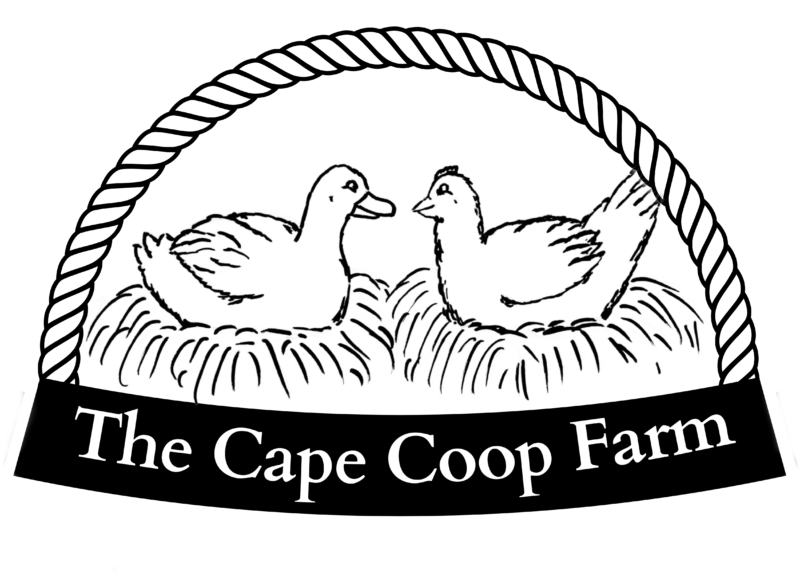
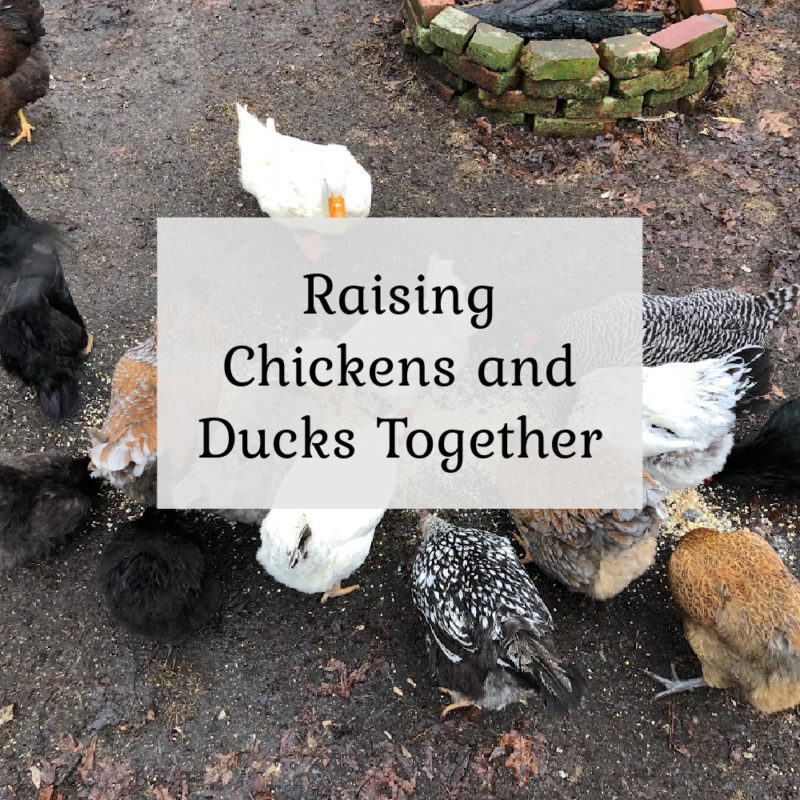

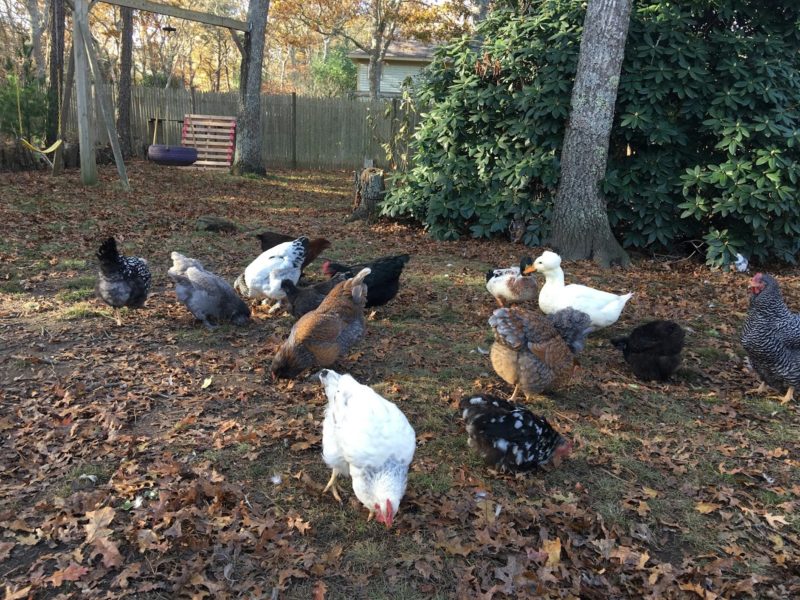
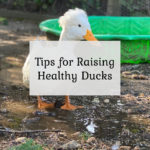
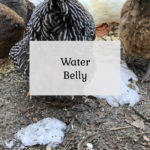
S.diane
Sunday 18th of August 2024
Hey guys it's very early here I wrote incorrectly I am reading up on chicken and ducks also considering baby goat just trying to find my way sdw
Liz
Sunday 18th of August 2024
Welcome! There is a bit of a learning curve but I hope you find lots of information here. I recommend starting with chickens, get used to their care, then add one other animal. Go slow and build as your knowledge grows!
Devin Hafley
Wednesday 1st of May 2024
So we have a mixed flock and our run has sand but the ducks are making sure it stays wet and its just a mess- any recommendations on what to keep on the ground in the run. We let them out in the yard alot but we also have to leave sometimes and like to put them in the run as the hawks are always on the prowl.
Liz
Thursday 2nd of May 2024
Sand is the best option for keeping the run dry. How thick is your sand layer? Maybe you need to make it a little deeper if you are finding it is still muddy. If that isn't working another option would be to use gravel as a base. Keeping a duck area dry is always challenging, good luck!
Mary cutajar
Saturday 6th of April 2024
Have free-range backyard farm. 1 drake 2 females and plenty of chickens and roosters. Now that the chick's have hatched the drake is eating them and being much larger the mother hen can't do much. Can you suggest anything. Would like to keep everyone free range. Ducks and chickens.
Liz
Sunday 7th of April 2024
Oh no! Drakes and roosters can always be tricky when new babies enter the flock. You are going to either need to seperate the mom and chicks or the drake until those chicks get a little bigger. Can you section off part of the coop or run where you could keep them? Once the chicks are bigger (6-7 weeks) you should be able to let everyone free range together again
Lisa
Saturday 14th of October 2023
Hi, I have 13 hens and 2 roosters. My son gave me 2 more hens and 1 duck. The hens I have no issue with however the duck I’m a little hesitant. At this time they’re forced in their run (10x20) because I’m reseeding their pasture. Will I need to keep the duck separate until they’re able to go to pasture?How do I set up a place that’s comfortable for the duck in the open area of the run? I put some straw down in the separate tractor we have and the 2 new hens just kick it around. Lol any suggestions on how to incorporate this single duck into the flock?
Liz
Tuesday 24th of October 2023
Is the duck male or female? If the duck is male you could end up with problems on your hand. With no available female ducks he will certainly try to mate with your female chickens. They have very different anatomy and he could end up killing your hen by mating it. If the duck is female she should have no issues living with the chickens. BUT she will be much happier if you get her a duck friend or two (females). Ducks don't need much, they sleep on the ground so somewhere safe from predators and sheltered is fine for sleeping. But if she is alone she is going to be really scared & stressed out. If you don't plan to add more ducks I would suggest just allowing her to sleep in the chicken coop. My ducks, geese, & chickens share a coop and get along just fine. You will want to introduce the duck to the flock the same way you add new chickens, keep them seperated for a week or two where they can see each other but can't get to each other so they can get used to one another without fighting.
Kashif Ullah
Friday 17th of March 2023
Tips For Raising Chickens And Ducks Together: Provide adequate space: Both chickens and ducks require space to roam and exercise. Make sure the coop and run are spacious enough to accommodate both types of birds comfortably. Separate feeding and watering areas and ducks have different dietary needs and feeding habits. Provide separate feeding and watering areas for each species to avoid conflict and ensure they are getting the appropriate nutrition. Keep the coop clean and dry: Both chickens and ducks can create a lot of waste, so it's important to keep the coop clean and dry to prevent the buildup of bacteria and disease.